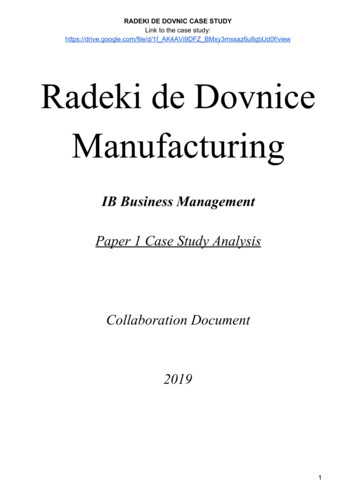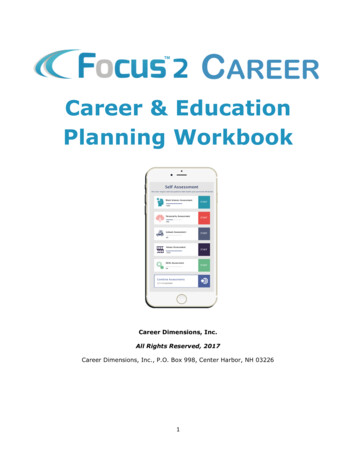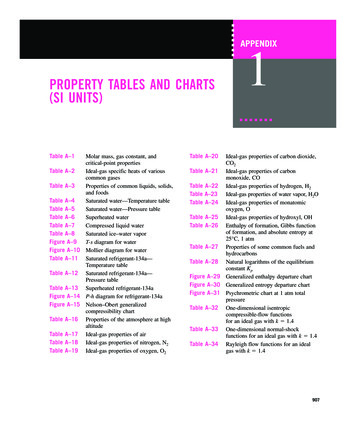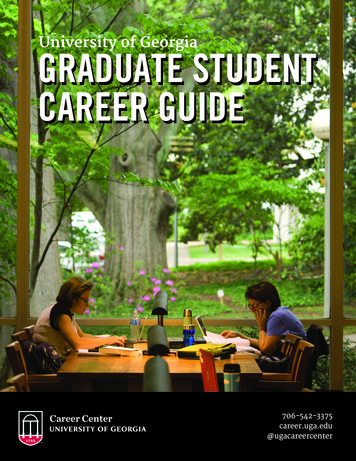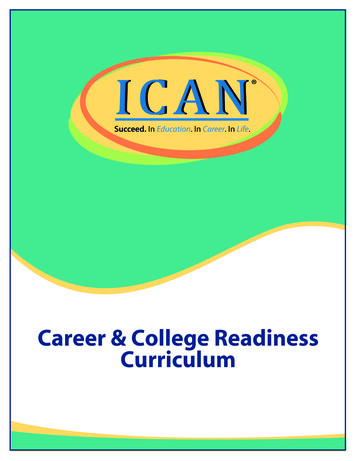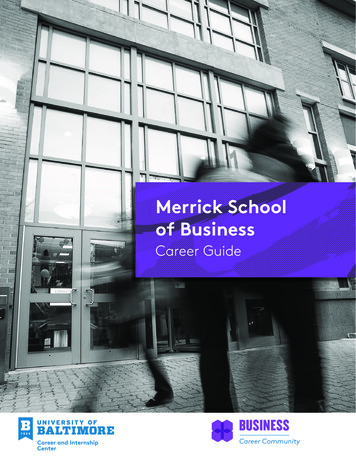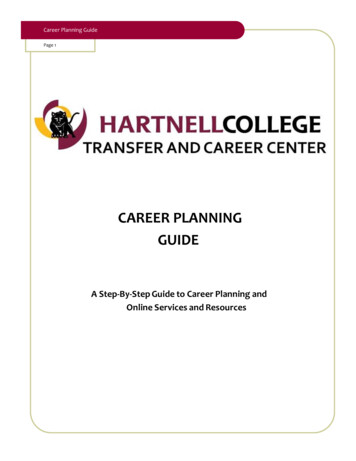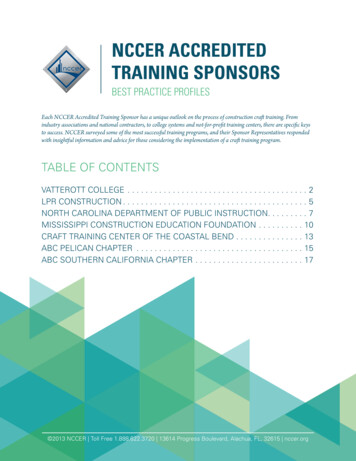
Transcription
NCCER ACCREDITEDTRAINING SPONSORSBEST PRACTICE PROFILESEach NCCER Accredited Training Sponsor has a unique outlook on the process of construction craft training. Fromindustry associations and national contractors, to college systems and not-for-profit training centers, there are specific keysto success. NCCER surveyed some of the most successful training programs, and their Sponsor Representatives respondedwith insightful information and advice for those considering the implementation of a craft training program.TABLE OF CONTENTSVATTEROTT COLLEGE . . . . . . . . . . . . . . . . . . . . . . . . . . . . . . . . . . . . . . . . . 2LPR CONSTRUCTION. . . . . . . . . . . . . . . . . . . . . . . . . . . . . . . . . . . . . . . . . . 5NORTH CAROLINA DEPARTMENT OF PUBLIC INSTRUCTION. . . . . . . . . . 7MISSISSIPPI CONSTRUCTION EDUCATION FOUNDATION . . . . . . . . . . . 10CRAFT TRAINING CENTER OF THE COASTAL BEND. . . . . . . . . . . . . . . . 13ABC PELICAN CHAPTER . . . . . . . . . . . . . . . . . . . . . . . . . . . . . . . . . . . . . . 15ABC SOUTHERN CALIFORNIA CHAPTER . . . . . . . . . . . . . . . . . . . . . . . . . 17 2013 NCCER Toll Free 1.888.622.3720 13614 Progress Boulevard, Alachua, FL, 32615 nccer.org
BEST PRACTICE PROFILESVATTEROTT COLLEGEVatterott College is an Olivette, Missouri-based college system founded in 1969 specializingin career and technical training for students in the Midwest. The organization’s first NCCERAccredited Training and Education Facility (ATEF) came aboard in 2008. Since that time, thecollege has significantly expanded its use of NCCER curricula, now offering NCCER credentialsat 10 campuses across five states and online.As of May 2013, Vatterott employs a team of 59 NCCER-certified craft instructors to deliver itsprograms and has had approximately 3,500 students earn NCCER’s industry-recognized, portablecredentials since becoming accredited. Vatterott’s construction training programs that incorporateNCCER curriculum include Building Maintenance, Electrical, HVAC, Plumbing, Welding,Wind Energy and Your Role in the Green Environment (offered online as a continuing educationcourse). Vatterott’s construction craft training programs have graduation and hiring rates thatmeet and often exceed placement requirements set forth by the Accrediting Commission ofCareer Schools and Colleges (ACCSC). Currently, Vatterott’s craft training programs utilize thefollowing NCCER curricula: Carpentry Electrical Electronic Systems Technician HVAC Industrial Maintenance Electrical & Instrumentation Technician Industrial Maintenance Mechanic Plumbing Welding Wind Turbine Maintenance Technician Your Role in the Green EnvironmentAccording to NCCER Sponsor Representative Melissa Gaines, Vatterott incorporated industryrecognized credentials into its construction training programs because it recognized thedemand for skilled workers in the industry. “There is a shortage of qualified individuals in theworkforce, and a future need for trained craft professionals to replace the retiring baby-boomers.Additionally, this generation prefers to learn at an accelerated rate and work with their hands. Thetraditional classroom-based learning environment is not as appealing to most young people as itwas 15 years ago,” said Gaines.Since accreditation, Vatterott has expanded and developed its programs and processes to include anumber of innovative best practices, such as:Industry Outreach and PartnershipIndustry advisory boards for each of Vatterott’s craft training programs meet twice yearly to reviewtraining and update standards as needed. The individuals who sit on these boards represent a widevariety of organizations, ranging from local contractors and suppliers to large, national employersand government agencies such as FedEx and the U.S. Department of Labor. In addition, thecollege has received numerous equipment donations that have helped to defray the costs ofequipment maintenance and replacement as a result of ongoing communication with industry. 2013 NCCER Toll Free 1.888.622.3720 13614 Progress Boulevard, Alachua, FL, 32615 nccer.org2
BEST PRACTICE PROFILESAt its NCCER accredited locations, Vatterott has also partnered with local chapters of theAssociated Builders and Contractors (ABC). ABC registers students with the U.S. Departmentof Labor for Registered Apprenticeship, provided the student makes the appointment foran interview and meets documentation requirements. Through these partnerships, Vatterottstudents are able to earn NCCER credentials, get on-the-job training documented as part of aRegistered Apprenticeship program and are entered into a pool of candidates to be considered foremployment by local contractors. ABC students who successfully complete NCCER curriculumand a Registered Apprenticeship program are awarded full credit equivalent to Vatterott’s diplomaprogram. ABC graduates are also permitted to enroll in Vatterott’s Associates’ Degree programs,and can earn degrees in as little as 30 weeks.Community OutreachThrough various community and education initiatives, Vatterott’s craft training programs haveincorporated community involvement as a way to offer its students on-site job experience whilealso completing NCCER performance testing at no cost. As a component of its programs,Vatterott requires its craft training students to work with Habitat for Humanity at least one dayper month.In recognition of Vatterott’s contribution, the organization received the “American Dream MakerAward,” from Truman Heritage Habitat for Humanity in Independence, Mo. Vatterott crafttraining students also took part in an Extreme Makeover Home Edition project in Joplin, Mo.in 2012.Program AdministrationIn its on-campus facilities, Vatterott provides well-equipped, clean training rooms employing themost current technology. To help students understand how each craft affects the “big picture” ofa project, instructor often employ projects that involve multiple crafts. Through this collaborativeapproach, each craft has its own stations where students perform their part of the projectwhile individual instructors monitor them throughout the circuit. In addition to encouragingcooperative learning amongst students, this unique approach also maximizes efficiency for lab useand the performance testing required to earn NCCER credentials.The NCCER Sponsor Representative has implemented an extensive, multi-layered evaluationsystem, including: Two student evaluations of instructors and courses per 10-week “phase”; Supervisor evaluation of instructors during each phase; and A complete, audit quality evaluation of each ATEF site at least annually.This detailed evaluation process allows for more efficient collection of data required for NCCERannual reporting, and allows the Sponsor Representative to monitor, evaluate and improveprogram performance. 2013 NCCER Toll Free 1.888.622.3720 13614 Progress Boulevard, Alachua, FL, 32615 nccer.org3
BEST PRACTICE PROFILESInstructor TrainingAs is always advisable, Vatterott’s Sponsor Representative provides detailed guidance tonewly certified NCCER instructors to ensure that they thoroughly understand their roles andresponsibilities in the NCCER process. As such, she personally trains instructors to use the onlinetraining report form (Form 200) by providing written instructions, observing self-tutoring,correcting and working directly with instructors to demonstrate how she receives, approves, andforwards their forms to NCCER. This detailed process provides her with feedback on the utilityof her instructor training processes and provides the instructors with an overall understanding ofthe credential submission process.SummaryVatterott’s craft training programs exhibit characteristics of a successful NCCER ATEF. Theorganization has exemplary record-keeping systems that are consistently applied throughout thecampus system. The Sponsor Representative is enthusiastic and committed to complying withNCCER requirements, and has established multi-layered oversight systems to ensure that allcampuses and instructors are aligned. The organization closely monitors the availability of toolsand materials necessary for performance training and testing. Their training labs are extremelywell equipped and kept in pristine condition, with the most current technology. Performancetraining is integrated into every class, and into community outreach activities (e.g. Habitatfor Humanity).When asked what advice she would give to career colleges interested in implementing NCCERtraining, Matthews noted the following as keys to success: Taking time to understand NCCER Guidelines and Program Compliancerequirements; Offering initial training to instructors; Making sure all questions are answered from the employees concerning the processin a timely fashion; Reporting credentials after each course; Offering follow-up training to ensure that the NCCER process is understood; Developing a set of standards for timely credential submissions; Monitoring the ANR (NCCER’s web-based credential database) Developing relationships with the construction community; and Keeping records in order. 2013 NCCER Toll Free 1.888.622.3720 13614 Progress Boulevard, Alachua, FL, 32615 nccer.org4
BEST PRACTICE PROFILESLPR CONSTRUCTIONLPR Construction is a steel erection and heavy industrial construction firm based in Loveland,Colorado. The company was founded in 1979 and now completes commercial, industrial andpower plant projects across the United States. LPR first became accredited to deliver NCCERtraining in 2008. Initially introduced to NCCER by the Associated Builders and Contractors(ABC), LPR construction played a critical role in providing Subject Matter Experts (SMEs) inNCCER’s first edition of the Ironworker curriculum. LPR, as an organization, was promptedto deliver NCCER training and assessments as a way to provide their employees with portablecredentials which would be recognized by the customers they served.Currently, LPR employs 15 NCCER certified instructors, and over 2000 LPR employees haveearned NCCER credentials since the organization was accredited in 2008. NCCER training isoffered at LPR for the following craft areas: Pipefitter Welding Rigging Mobile Crane Operator Crew Leader Project Supervision Project Management Field Safety Safety TechnologyLPR is also an Accredited Assessment Center (AAC) through NCCER and provides assessmentsfor each craft training area they offer. LPR Ironworker assessment candidates have an averagepassing rate of 87% and Crane Operator assessment candidates have an average passing rateof 98%.Educational PartnershipsLPR leadership approached a local community college to help start an Ironworking/Weldingprogram. The college was receptive in light of funding that was cut for Career and TechnicalEducation (CTE). The Ironworking/Welding class was opened as an option to local high schoolstudents as well.This partnership has benefitted LPR directly, enabling the organization to recruit the very best outof each Ironworking class for future employment. Each year LPR delivers a 100-hour Ironworkerclass for 25-30 apprentices that have no industry experience. Typically five to seven students fromthe college Ironworker program attend the class as new LPR employees.To other construction companies looking to partner with local educational institutions, McClureadvised, “Be persistent and very patient when dealing with school systems. The schools and stateinstitutions do not operate with the same sense of urgency as the private sector.” 2013 NCCER Toll Free 1.888.622.3720 13614 Progress Boulevard, Alachua, FL, 32615 nccer.org5
BEST PRACTICE PROFILESBenefits of Craft TrainingLPR Construction has reported positive influence on their quality of employees, as well as betteremployee retention due to starting an NCCER craft training program. They have also seen anotable decrease in job-site injuries and an increase in projects being completed before deadlines.NCCER training and industry-recognized credentials have also been attributed to benefittingLPR employees by defining a clear career path. “The industry-recognized credentials have servedas a source of pride for our employees who did not complete higher education,” McClure said.LPR offers a direct incentive for earning NCCER credentials. All apprentices who are enrolledin an LPR Construction apprentice program receive a 1/hour raise every six months with thesuccessful completion of their assigned modules and performance tests.With a successful training program now in place, McClure offered advice to those organizationswho are starting their programs: “Identify the training program that will meet the most criticalbusiness needs first, and develop/institute that program. Once you have the first program runningsmoothly and effectively, add additional programs. Do not try and tackle all the training on yourcompany’s wish list all at once. It’s like eating a whale; it must be done one piece at a time.”Assessment CoordinationConstruction industry organizations across the board must balance the demand for craft workerswith the fluctuations of each job site. NCCER assessments can give a broad picture of what skillseach craft worker possesses before they even begin work. When LPR first began offering NCCERtraining, their protocol called for each new employee to be given an NCCER assessment for theircraft within the first 30 days of employment. After some complications LPR revised their protocol,and each new hire is instructed to take their NCCER craft assessment before arriving on site. LPRuses the NCCER website to locate nearby assessment centers, helping to improve coordination.SummaryLPR Construction is an example of an industry contractor successfully implementing NCCERtraining and assessments for the benefit of craft professionals, and the greater organization as awhole. Semi-annual training meetings take place with key company stakeholders and training staffto address any issues in a timely manner. This top-down approach proves a serious commitmentto craft training’s impact on the industry. With an intentional connection to the local educationsystem, and a careful programming strategy, LPR has made the most of NCCER’s training,assessments and portable credentials. 2013 NCCER Toll Free 1.888.622.3720 13614 Progress Boulevard, Alachua, FL, 32615 nccer.org6
BEST PRACTICE PROFILESNORTH CAROLINA DEPARTMENT OFPUBLIC INSTRUCTIONThe North Carolina Department of Public Instruction (NCDPI) represents the public schoolsystem for the entire state. North Carolina public schools started utilizing NCCER curriculum inthe mid 90’s through the initial leadership of Carolinas Associated General Contractors (AGC)Vice President, Tommy Caldwell, and NCDPI Consultant Sherrill Goodman. In 2009 NCDPIbecame the official NCCER sponsor for the established program, and is now represented byCraig Pendergraft, Education Consultant, Student Certification and Credentialing, Career andTechnical Education for NCDPI.Several decades ago, NCDPI recognized the industry demand for a skilled and trained workforceand sought out NCCER curriculum for their CTE program. The initial sponsor was the CarolinasAGC chapter. The curriculum process and credentialing of students was hampered by theunderestimated number of student credential completions. This became a challenge for thesponsor. As the need for national industry recognized credentials grew, the NCPDI CTE divisionbegan to look for alternative ways to sponsor the NCCER program. After conducting industry andstakeholder surveys and meetings, the consensus was that NCDPI CTE would be best to sponsora successful program.The official proposal for adoption of the NCCER curriculum by State Board of Education,for the Construction Education Program areas, to include Carpentry, Electrical Trades, andMasonry, occurred during the 2008-2009 calendar school year. Currently, the NCDPI offersCore Curriculum, Carpentry, Construction Technology, Electrical, HVAC, Masonry, Plumbing,Welding, Weatherization, and Your Role in the Green Environment. Each craft training areais closely monitored by statewide associations, contractors, community colleges and otherworkforce development agencies in order to meet industry demand.Currently, NCDPI has over 600 NCCER certified instructors teaching in their CTE division.In the past three years alone, 13,515 students have earned NCCER credentials. The program’ssuccess has been highlighted in the positive high school graduation rate - in 2012 94% of allNorth Carolina students enrolled in a CTE program graduated high school, compared to 80% oftraditional students.Industry PartnershipIn 2009, when the NCDPI program was restructured, official partnerships were established withvarious industry associations including: Carolinas AGC, the Associated Builders and Contractors,Inc. (ABC), the North Carolina Home Builders Association (NCHBA), the North CarolinaAssociation of Electrical Contractors (NCAEC), the Carolina Electrical Contractors Association(CECA), the Brick Association of Carolinas, the North Carolina Masonry ContractorsAssociation (NCMCA), the North Carolina Department of Transportation (NCDOT),many large and small contractors, and the North Carolina Community College System. CraigPenedergraft, NCDPI’s sponsor representative, credits the success of NCDPI’s constructioneducation program to “the relationships that existed and continues to grow between all of ourpartners and the NCDPI consultants.” 2013 NCCER Toll Free 1.888.622.3720 13614 Progress Boulevard, Alachua, FL, 32615 nccer.org7
BEST PRACTICE PROFILESEach partnership plays a unique role for this statewide program. Local and state-level associationssuch as NCHBA, CACG, ABCC, NCMA, CECA, NCAE come together with local contractorsand suppliers to support high schools by serving on advisory committees and providing guidance.These partners also arrange field trips, provide materials and supplies, serve as guest speakers, aswell as chairing SkillsUSA regional and state competitions.For large organizations, like school districts, who are planning the launch of an NCCER program,Pendergraft suggests gathering support from associations and contractors who already usethe NCCER process. He also encourages other sponsor representatives to educate their localworkforce development agencies, community colleges and industry organizations that are notfamiliar with NCCER. In this way, there is support for the NCCER process “from the top down.”Taking ownership through accreditation for an entire school system gives a strong foundation foreducation and industry partnerships .College CreditTo provide a clear path for students, NCDPI involved the North Carolina Community Collegeboard in the initial advisory board for the NCCER statewide program. During conversationsabout seeking NCCER accreditation for the state of North Carolina, it was critical to provide aclear understanding about how student articulation would happen from high school level coursesto those programs offering college credit. The conversation is still ongoing, allowing high schoolinstructors to collaborate with college instructors who offer NCCER credentials.Program CostsImplementing and maintaining an NCCER craft training program may have varying costs,dependent on the size, scope and type of organization sponsoring. The basic cost considerationsfor the NCDPI included:Implementation Initial fee to become an NCCER Accredited Training Sponsor Cost of sending 25 people to the Master Trainer Instructor Certification Training Program Accredited Training and Education Facility application fee for each school participating Bringing participating schools to NCCER standards based on facilities and equipment Teacher salaries Instructor Certification Training Program training and kits Textbooks – 25 books per set for each program, per school including teacher and studenteditions for Core Curriculum and levels one and two of specified crafts Annual NCCER maintenance fee 2013 NCCER Toll Free 1.888.622.3720 13614 Progress Boulevard, Alachua, FL, 32615 nccer.org8
BEST PRACTICE PROFILESProgram BenefitsAfter four years as the official NCCER sponsor, the NCDPI has seen valuable benefits from theirNCCER craft training programs. From the student perspective, high school students who haveattained a credential, obtain a documented skill set, and are, therefore, more marketable in theemployment arena (helping to reduce training costs for business owners) and better preparedto succeed in a post-secondary environment. A benefit for educators is the ability to gauge thelevel of understanding regarding specific skills and knowledge within a course of study and adjustinstruction as needed to ensure student competence.Overall, the value of CTE is highly recognized in North Carolina. The mission of NC secondaryCTE is to empower all students to be successful citizens, workers and leaders in a global economy.The hands-on approach, a standard in the CTE classroom/lab, provides students the doublevalue-added opportunity to “touch” and “experience” what they are learning. Students not onlylearn the theory, but put that theory to practice; using the relevant tools and equipment in relationto the curriculum and potential career choice in which the student is interested. Pendergraftadvised that to make the most of an NCCER program, the sponsor should “Focus on the processof standardized, stackable credentialing that will lead to productive employment and postsecondary opportunities.”SummaryRunning a CTE program over an entire state of public educational agencies is no small or easytask. Pendergraft noted that each achievement for the NCDPI has been a team effort:“Communication, collaboration, and leadership are vital attributes that have helped to ensuresuccess with implementing, maintaining, and growing our NCCER programs. The collaborativeefforts between the NCDPI CTE designated NCCER Sponsor, State CTE Directors, RegionalCoordinators, various other LEA staff members, the ICTP-trained classroom instructor, andBusiness and Industry Partners, combined with consistent communication and direct leadershiphave helped to make our programs successful.” 2013 NCCER Toll Free 1.888.622.3720 13614 Progress Boulevard, Alachua, FL, 32615 nccer.org9
BEST PRACTICE PROFILESMISSISSIPPI CONSTRUCTION EDUCATIONFOUNDATION (MCEF)At the request of the Mississippi construction industry, the Mississippi Construction EducationFoundation (MCEF) applied to become an NCCER Accredited Training Sponsor in 1996.The MCEF board recommended NCCER craft training for secondary and post-secondary crafttraining across the entire state, and together, they set a goal of building and ensuring a qualityworkforce in Mississippi.Today, MCEF’s NCCER craft training program oversees 200-250 craft instructors andapproximately 4,500 high school students earn NCCER credentials each year. MCEF hasdeveloped an apprenticeship program for post-secondary craft training that had 309 studentsenrolled in 2012 alone. According to MCEF president and sponsor representative Mike Barkett,MCEF’s NCCER craft training programs have an 80% graduation rate, and it’s apprenticeshipprograms have a 100% graduation rate. The crafts offered are as follows:High SchoolApprenticeship (for adults 18 & over) Carpentry Electrical HVAC Masonry Sheet Metal Industrial Maintenance Construction Trades Welding Carpentry Electrical HVAC Plumbing Industrial Maintenance-Mechanical Sheet Metal Pipefitting WeldingIndustry PartnershipsThe MCEF organization is in close partnership with industry. Organized in 1996, a coalition ofconstruction associations joined together to establish MCEF. The nine major trade associationsrepresented on MCEF’s board are as follows: Associated Builders & Contractors Associated General Contractors American Subcontractors MS Asphalt Association MS Concrete Industries Association MS Manufacturers Association MS Road Builders Association National Assoc. of Women in Construction Southern Brick InstituteMCEF also partners with the State Board of contractors, MDE, SkillsUSA and industry to hostthe annual MCEF SkillsUSA Craft Championship. Industry partners provide sponsorships,judges, project managers and exhibits. All partners are involved with the planning committee. 2013 NCCER Toll Free 1.888.622.3720 13614 Progress Boulevard, Alachua, FL, 32615 nccer.org10
BEST PRACTICE PROFILESA common agenda of recruiting and training a quality workforce for the construction industryhelped develop a foundation for this long-standing partnership. Each association has arepresentative on the MCEF Board of Directors. The board meets six times a year with anexecutive board meeting intermittently as needed. MCEF benefits greatly from having this directtie with industry.Educational PartnershipsMCEF has a ten-year, on-going partnership with the Mississippi Department of Education(MDE) to deliver the NCCER curriculum and credential high school students in 198 programsin 106 career and technical centers. MCEF has an additional agreement with MDE (on an annualcontract basis) to monitor Mississippi’s high school construction CTE programs.Additionally, MCEF has a partnership with the Mississippi State Board of Contractors to offerscholarships to outstanding high school seniors in construction CTE programs in Mississippi’sATEF schools to continue their education in preparation for careers in the industry.A common agenda with all stakeholders in industry and education has been the greatestkey to success for the MCEF. Barkett also advised that programs should “communicate andcommunicate often” with all possible partners.College CreditMCEF has articulation agreements with all community colleges that offer CTE constructioncourses for up to 32 academic hours for the apprenticeship program. MS Gulf Coast Community College Copiah-Lincoln Community College Hinds Community College Holmes Community College Jones Community College Pearl River Community College MS Delta Community College Northwest MS Community College Itawamba Community College Meridian Community College Southwest MS Community College East Central MS Community College East MS Community College Northeast MS Community CollegeIn order to establish recognition of NCCER craft training for college credit at these institutions,MCEF made the request and showed how awarding credit would benefit the student, MCEF,and the college. For MCEF, offering college credit is often an incentive for students to enroll inNCCER training and gives them the opportunity to progress. 72% of apprenticeship studentsindicate that receiving college credit is extremely important to them and their long-term career goals.When asked for advice on creating college credit opportunities for NCCER craft trainees,Barkett responded, “Develop partnerships with secondary schools, state department ofeducation, community colleges, and industry. Secure an articulation agreement and continue tocommunicate with high school and college CTE directors on its use.” 2013 NCCER Toll Free 1.888.622.3720 13614 Progress Boulevard, Alachua, FL, 32615 nccer.org11
BEST PRACTICE PROFILESProgram CostsEach NCCER Accredited Training Sponsor has varying costs and revenue sources. For MCEF, allsecondary programs are funded by an annual 600,000 grant from the Mississippi State Board ofContractors. The post-secondary apprenticeship program is set up with a tuition-based format tocover costs.MCEF has also received several DOL training grants for training youth, underemployed andunemployed. Many of these participants entered the MCEF apprentice program to further theirtraining and begin careers in construction.Program BenefitsBy offering craft training directly tied to an industry-recognized credential, students are given ajump start into the construction industry. High school students who graduate from the MCEFsecondary program earn NCCER Core and Level 1 credentials in their particular craft. Forapprenticeship students, their NCCER credentials provide recognition in the constructionindustry and an advantage in the hiring process. After 17 years as an NCCER Accredited TrainingSponsor, MCEF staff has continued to see that NCCER program graduates are work-ready andthe courses of study are relevant and current.SummaryDue to a long-term relationship with the Mississippi Department of Education, and purposefulpartnership with area industry leaders, the MCEF has seen state-wide success for implementingand maintaining an NCCER training program. All education and industry partners cametogether, laid their respective individual agendas aside, and agreed on a common agenda – qualityconstruction education. 2013 NCCER Toll Free 1.888.622.3720 13614 Progress Boulevard, Alachua, FL, 32615 nccer.org12
BEST PRACTICE PROFILESCRAFT TRAINING CENTER OF THECOASTAL BENDThe Craft Training Center of the Coastal Bend (CTCCB) was founded in 1987 by The CoastalBend Business Roundtable and local contractors represented by The Associated Builders andContractors (ABC), Texas Coastal Bend Chapter to provide craft training in the Coastal Bendof Texas. When NCCER training programs were developed, CTCCB immediately began usingthe curriculum and became an Accredited Training Sponsor. The CTCCB primarily offers crafttraining toward the industrial crafts due to area demand and financial support from the industrialconstruction sector.The CTCCB currently employs 23 NCCER certified instructors. According to CTCCB presidentand NCCER sponsor representative, Dr. Anne Matula, 5,189 students have earned NCCERcredentials since CTCCB began delivering craft training, and
college has significantly expanded its use of NCCER curricula, now offering NCCER credentials at 10 campuses across five states and online. As of May 2013, Vatterott employs a team of 59 NCCER-certified craft instructors to deliver its programs and has had approximately 3,500 students earn NCCER's industry-recognized, portable

